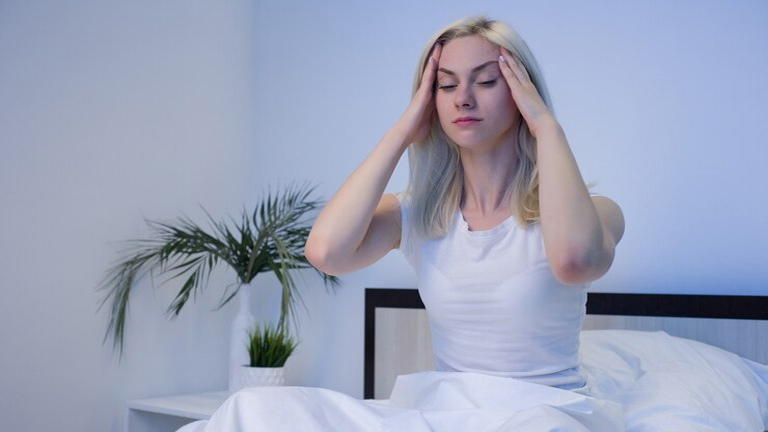Insomnia is a common sleep disorder affecting millions of people worldwide. It can lead to fatigue, mood disturbances, and decreased productivity. Recognizing insomnia symptoms early is crucial for effective treatment and better sleep quality. In this comprehensive guide, we’ll explore the key signs, causes, and remedies for insomnia to help you regain restful sleep.
Must Check: Exercise for Mental Health
What Are the Most Common Insomnia Symptoms?
People with insomnia often experience a variety of symptoms that disrupt their daily lives. Here are the most prevalent signs:
1. Difficulty Falling Asleep
One of the primary insomnia symptom is trouble initiating sleep. Individuals may lie awake for hours, unable to drift off despite feeling tired.
2. Frequent Nighttime Awakenings
Waking up multiple times during the night and struggling to fall back asleep is another hallmark of insomnia.
3. Waking Up Too Early
Some people with insomnia wake up much earlier than intended and cannot return to sleep, leading to insufficient rest.
4. Daytime Fatigue and Sleepiness
Poor sleep quality results in excessive tiredness during the day, making it hard to concentrate or stay alert.
5. Mood Disturbances
Irritability, anxiety, and depression are common in people with chronic insomnia due to prolonged sleep deprivation.
6. Cognitive Impairments
Insomnia affects memory, focus, and decision-making abilities, reducing overall productivity.
7. Physical Symptoms
Headaches, gastrointestinal issues, and muscle tension can also accompany insomnia.
Types of Insomnia and Their Symptoms
Insomnia can be categorized into different types, each with distinct insomnia symptom:
1. Acute Insomnia (Short-Term)
-
Lasts for a few days or weeks
-
Often triggered by stress or life changes
-
Resolves without long-term treatment
2. Chronic Insomnia (Long-Term)
-
Occurs at least three nights a week for three months or more
-
May be linked to underlying medical or psychological conditions
-
Requires medical intervention
3. Onset Insomnia (Difficulty Falling Asleep)
-
Trouble initiating sleep at the beginning of the night
-
Common in people with anxiety disorders
4. Maintenance Insomnia (Difficulty Staying Asleep)
-
Frequent awakenings during the night
-
Often seen in older adults or those with medical conditions
What Causes Insomnia?
Understanding the root causes of insomnia symptom can help in finding the right treatment. Common triggers include:
1. Stress and Anxiety
Worries about work, relationships, or finances can keep the mind active at night.
2. Poor Sleep Habits
Irregular sleep schedules, excessive screen time, and caffeine intake can disrupt sleep.
3. Medical Conditions
-
Chronic pain
-
Asthma
-
Acid reflux
-
Hyperthyroidism
4. Mental Health Disorders
-
Depression
-
PTSD
-
Bipolar disorder
5. Medications
Some prescriptions (e.g., antidepressants, blood pressure medications) can interfere with sleep.
6. Lifestyle Factors
-
Alcohol and nicotine use
-
Lack of physical activity
-
Shift work
How to Diagnose Insomnia
If you experience persistent insomnia symptoms, consult a healthcare provider. Diagnosis may involve:
1. Sleep Diary
Tracking sleep patterns, bedtime routines, and daily habits.
2. Medical Evaluation
Checking for underlying health conditions contributing to sleep problems.
3. Sleep Studies (Polysomnography)
Conducted in a sleep lab to monitor brain activity, breathing, and movements during sleep.
Effective Treatments for Insomnia
1. Cognitive Behavioral Therapy for Insomnia (CBT-I)
-
Helps change negative thoughts and behaviors around sleep
-
Highly effective for chronic insomnia
2. Medications
-
Prescription sleep aids (short-term use)
-
Melatonin supplements
3. Lifestyle Changes
-
Establishing a consistent sleep schedule
-
Reducing caffeine and alcohol intake
-
Creating a relaxing bedtime routine
4. Natural Remedies
-
Herbal teas (chamomile, valerian root)
-
Meditation and deep breathing exercises
-
Aromatherapy (lavender oil)
5. Sleep Environment Optimization
-
Keeping the bedroom cool, dark, and quiet
-
Investing in a comfortable mattress and pillows
Insomnia Symptoms, Types, and Treatments at a Glance
| Category | Details |
|---|---|
| Common Symptoms | Difficulty falling asleep, frequent awakenings, early waking, daytime fatigue, mood swings, poor concentration |
| Types of Insomnia | – Acute (short-term) – Chronic (long-term) – Onset (trouble falling asleep) – Maintenance (trouble staying asleep) |
| Main Causes | Stress, poor sleep habits, medical conditions (e.g., chronic pain, asthma), mental health disorders (e.g., anxiety), medications |
| Diagnosis | Sleep diary, medical evaluation, sleep studies (polysomnography) |
| Effective Treatments | – CBT-I (therapy) – Sleep medications (short-term) – Lifestyle changes (consistent schedule, reduced caffeine) – Natural remedies (herbal teas, meditation) |
| When to See a Doctor | Symptoms last >1 month, daytime impairment, or safety risks (e.g., drowsy driving) |
When to See a Doctor
Seek medical advice if:
-
Insomnia symptoms persist for over a month
-
Daytime fatigue affects work or safety
-
You experience breathing difficulties or severe mood swings
Conclusion
Recognizing insomnia symptoms early can prevent long-term health complications. By understanding the causes and exploring effective treatments, you can improve sleep quality and overall well-being. If lifestyle changes don’t help, consult a healthcare professional for personalized care.


